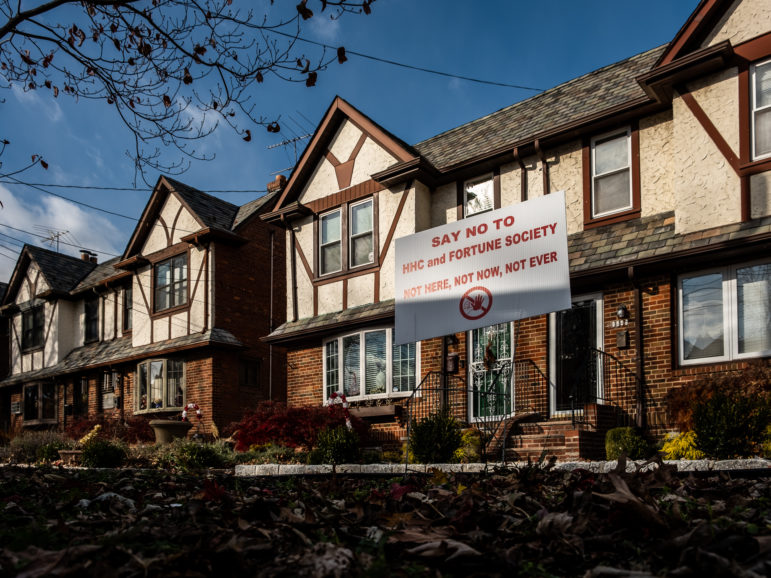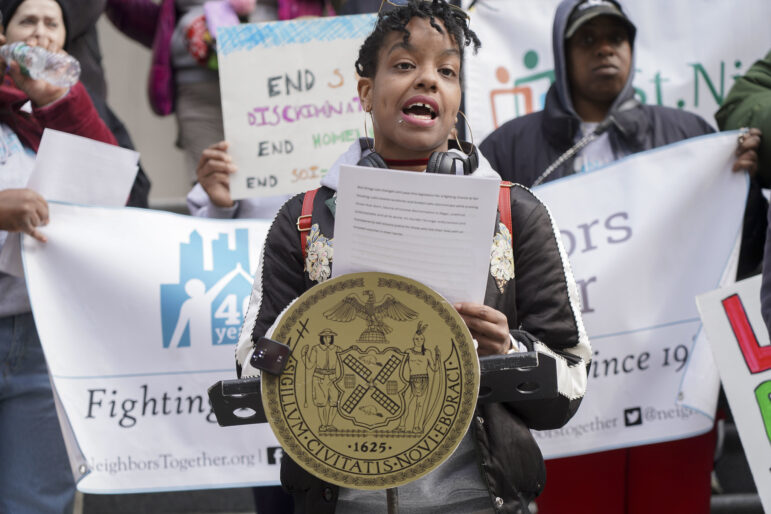During his first press conference as governor-designee on Thursday, David Paterson did little to answer questions about his policy priorities, but in response to a reporter’s query he did give a hint of the breadth of issues he’ll have to handle. “On congestion pricing, we’re taking a look at it,” Paterson said. “On violent killers, I’m taking a look at it.”
Paterson’s candor—and good humor—are said to be known quantities in Albany. But as Paterson was sworn in Monday, with everyone from Hillary Clinton to former governor Hugh Carey in attendance, much remained unknown about what new direction, if any, the state may take with a new captain at the helm. Whether at state agencies or major advocacy groups, by the end of last week those who monitor, lobby and staff his government could think of little to predict.
Their uncertainty reflects the fact that Empire State government was at a crossroads even before Eliot Spitzer’s “private matter” became public. Not only was the economy slowing rapidly, but major decisions about congestion pricing and development in New York City were looming as the state budget clock ticked. In other words, people aren’t sure what Paterson is going to do, but they weren’t certain of what Spitzer was going to do, either—especially amid partisan bitterness in Albany. “The level of hostility had reached a point where even basic work wasn’t getting done,” says Doug Forand, a strategist for the New York State Democratic Senate Campaign Committee.
The consensus is that Paterson will reduce that hostility. “The working relationship we have with David is spectacular. Everyone is looking forward to it,” says Lisa Black, a spokeswoman for the Republican majority in the State Senate.
A liberal Democrat and scion of Harlem’s black political establishment, Paterson was elected to the State Senate in 1985 representing a Harlem and Upper West Side district. He took control of the Democratic Senate caucus in 2002, ousting fellow Manhattan rep Martin Connor. In his last Senate election, in 2004, Paterson won with 93 percent of the vote. Spitzer tapped him as a running mate in early 2006. Paterson is widely regarded as the chummy antithesis to Spitzer’s hard-charging, remote personality.
Beyond changing the tone, people who spoke to City Limits did not expect Paterson to make any immediate, major shift in the executive branch’s approach, in part because Spitzer’s agency heads are likely to stay on. But while nothing is likely to change a lot, most things will probably change a little. “Obviously, everything is likely to be affected in one way, shape or form when you get a change at this point in the budget process and with so many major issues in the air,” says Chris Jones, research director at the Regional Plan Association.
Following the money
Paterson said Thursday that any changes made to Spitzer’s proposed budget would be the result of negotiation with legislative leaders, “not the product of an inherent disagreement” between Spitzer and himself. He pointed to a Spitzer promise “that we both believed in” to not raise taxes, said he remained committed to a plan to revive the economy of Buffalo, and took a wait-and-see approach to the idea of a property tax cap, which a commission is studying. Paterson’s been mum on Assembly Speaker Sheldon Silver’s proposal to raise state revenue by hiking income taxes for those making $1 million or more.
While Paterson has never overseen anything like the $120 billion operation of state government, he has run much smaller budgets before, namely those of his own campaigns. How a person spends money can be revealing (it certainly was for Spitzer.) In the last seven months of 2007, Paterson’s campaign account spent $150,000, and nearly half went to pay his fundraisers, but Rev. Al Shaprton’s National Action Network received $7,500 in donations, the NAACP got $3,500 and Hillary Clinton was sent $1,000. Paterson also spent $666 on at least 10 deliveries of flowers. He does, after all, have a reputation as a conciliator.
One question is whether the budget blueprint Spitzer left his successor was sound. Critics of different stripes have said parts of it weren’t. “On education,” says Karen Schimke, president of the Schuyler Center, an Albany human services advocacy group, “there was somewhat less spending than people expected to see, especially on Contract for Excellence,” the spending plan that came out of the Campaign for Fiscal Equity lawsuit over funding for city schools. Schimke was also concerned that Spitzer’s budget reduced the state share of funding for public assistance and eliminated it for juvenile detention.
For his part, Mayor Bloomberg tussled with the Spitzer administration over what City Hall said were lower-than-promised increases in direct aid and school construction funding. Sizing up Paterson’s possible budget, one city official took cold comfort in the fact that state funding “couldn’t get worse” than what Spitzer proposed.
Fiscal hawks, however, slammed Spitzer for profligate spending. “Spitzer’s approach to the budget was almost not reality-based. We have a $4.7 billion budget deficit that has to be closed,” says Nicole Gelinas, a fellow at the Manhattan Institute, who dismisses Bloomberg’s critique. Increases for the city, Gelinas said, are “just an academic argument because the state doesn’t have the money.”
Kathryn Wylde, president of the Partnership for New York City, a business lobby group, took heart from Paterson’s words about the budget last week. “Based on his comments at his press conference, he seems to have a very practical sense about taxes and the economy that we were glad to hear,” Wylde said.
“I think there will be consistency in policy direction,” she added. One of her top legislative priorities is an issue where Paterson’s views are unclear: congestion pricing. A state commission has put forward a revised version of Bloomberg’s plan to charge some drivers for access to a section of Manhattan.
Officially, there’s a March 31 deadline for the state to approve the plan if it hopes to win federal funding, but it’s unclear how genuine that time limit is. Both political parties are fractured over the proposal—and the debate is closely linked to the budget process. “There’s just a huge hole in the transportation budget that if they don’t approve congestion pricing, they’re going to have to come up with some other revenue-raiser,” says the RPA’s Jones.
Some congestion pricing supporters take comfort that lobbyists Bill Lynch and Luther Smith are advising Paterson, since the two have worked on behalf of Communities United for Transportation Equity (COMMUTE), a coalition that supports the pricing plan. “What’s really changed are the voices that [the governor] might listen to,” says Gene Russianoff, a congestion pricing supporter and campaign attorney at the transit advocacy group Straphangers’ Campaign. Referring to COMMUTE, he adds, “I think their voice will be magnified in Albany as opposed to, say, the General Contractors Association.” Paterson’s inner circle in the governor’s office will also include Charles O’Byrne, a former Jesuit priest and longtime adviser. Operations director Paul Francis and budget chief Laura Anglin are among several holdovers from the Spitzer era.
Reformer in waiting?
After the budget and congestion pricing, the list of policy decisions grows. There’s the effort to reform the Wicks Law, a statute that requires expensive, multiple contracts on public works. There’s Chief Judge Judith S. Kaye’s campaign to raise judicial salaries. And there are the three large, complicated development projects in Manhattan: Moynihan Station, Hudson Yards and the Javits Center. All three, says Jones, are “at a point where decisions need to be made, but Paterson is going to need some time.” But on some projects—especially Hudson Yards—economic forces might overtake Paterson as a softening real estate market leads potential developers to bow out, notes Gelinas.
The Javits Center plan is linked to Spitzer’s initiative to provide more affordable housing—a top policy worry in the city, and one on which Spitzer left several open questions. (And Empire State Development Corporation’s downstate chairman Patrick Foye, who had oversight over Javits and other projects, just quit.) Spitzer, says Gelinas, was cool to the idea of raising the threshold at which apartments leave the rent stabilization system—which now occurs when monthly rent surpasses $2,000—but Paterson could be more supportive. Advocates for public housing say Spitzer only partially met their goals with last year’s modest increase in operating subsidies to the New York City Housing Authority; there’s hope that Paterson’s Harlem roots will translate into more action.
Some advocates are cheered by Paterson’s record as a legislator. New York League of Conservation Voters executive director Marcia Bystryn said in a statement that Paterson “is well positioned to tackle New York’s most pressing environmental challenges, especially in the area of energy.” And Citizen Action New York said in a statement that the new governor “has a long record of championing progressive issues in New York,” and hailed his support for Clean Elections, renewable energy and stem cell research, and his opposition to the current Rockefeller Drug Laws and the death penalty.
“He’s the best guy we could dream of,” says William Samuels, chair of the Democratic Senate Campaign Committee, and a supporter of reforms like fair redistricting and tougher campaign finance laws. “Spitzer had a confrontational approach, and that brought us some success. I think in the long run, a working-it-out process will work,” Samuels added. At last week’s press conference, Paterson said he wanted to get consensus in the legislature about changing campaign finance laws.
As a candidate and public official, Paterson has been taking policy positions for 23 years. In 1993, he ran for NYC public advocate, highlighting his support for a hate crimes bill and for preserving the African American Burial Ground in lower Manhattan. In 2005, Paterson addressed the National Commission on the Voting Rights Act, calling one Bronx state Senate district a “blatant white gerrymander” and contending that the Voting Rights Act “should never be used to justify overly packed minority districts.” Some of Paterson’s positions stirred controversy, like a bill to require police officers to “shoot to wound.” Last Thursday, Paterson reiterated his disavowal of the bill, claiming that a staff member submitted it and that he never actually supported it.
“I generally think that I have about the same general point of view” as earlier in his career, Paterson said last week. “There are some points of view that I’ve changed over the years, but I’m pretty much the same person.”
Making history
The Democrats have been in the Senate minority for all but one year since 1939, and are trying to change that in 2008. With a special election victory last month, the Democrats are finally just one seat away from taking control. But as Paterson moves to the governor’s mansion, Sen. Joseph Bruno remains majority leader and takes on the duties of the lieutenant governor, which could allow him to break ties in the Senate. Bruno maintains that this effectively gives him two votes—and a two-seat cushion in the upper house. (The state constitution has no mechanism for replacing a lieutenant governor.) A major question is whether the Spitzer scandal will thwart the Democrats’ bid for Senate control.
Republicans say the debacle in Albany has given them momentum—and an easier argument to make. “I think our message is helped by being so different from David’s, because David is very liberal and Spitzer was very moderate. Spitzer brought [Speaker] Shelly [Silver] to the table on things like civil confinement,” says Republican strategist Black, referring to the state’s move last year to confine some sex offenders beyond their prison terms.
“I don’t think it’s a division, but it is a sharp contrast” between Paterson and the Republicans, she says, especially if the state GOP moves right, as party bigwigs in Washington—who are advising the New York party on its search for a new state Senate campaign chairperson—are advising it to do.
Democrats disagree, arguing that local issues and individual candidates—not who sits in the governor’s chair—will determine who wins senate races. Democratic strategist Forand notes that despite Spitzer’s low poll numbers, Democrat Darrel Aubertine won last month’s special election in the Republican-majority 48th Senate district (in the northwest part of the state), after Republican incumbent James Wright retired. The presidential race is likely to boost turnout in November, which Forand says will help Democrats.
State Senators Serphin Maltese and Frank Padavan of Queens are two Republicans generally thought to be at the top of the Democrats’ list of electoral targets. Democratic leader Samuels has previously said that the state party probably only has the money to fund all-out efforts in two districts, but he is coy about where. “There are probably eight races where the right candidate can have a good chance to win,” he says. “I think it’s too early to say which of the eight seats will be the top two priorities.”
New York State governors have yielded to their lieutenants four times in the past century. Horace White served for a few months in 1910 when Gov. Charles Evan Hughes joined the U.S. Supreme Court. Martin H. Glynn succeeded Gov. William Sulzer in 1913 when the latter was impeached for misusing campaign funds. Charles Poletti took over from Gov. Herbert Lehman for a token 29 days in 1942 after Lehman took a federal post.
Most recently, in December 1973, Gov. Nelson Rockefeller quit to prepare for a potential final presidential run and Malcolm Wilson took over. But Wilson had been lieutenant for 15 years, was weighing his own candidacy for the top job when Rockefeller quit and launched right into his election campaign as soon as he took over. So, there’s not exactly a lot of policy-setting precedent for Paterson to follow. If there are any lessons from the year-long Wilson administration, one is that larger forces can intervene – Wilson was the favorite in the ’74 election, but Watergate-related anti-Republican sentiment doomed him. The other is that unforeseen problems can crop up: Wilson’s brief term saw the first stirrings of the city’s fiscal crisis.








